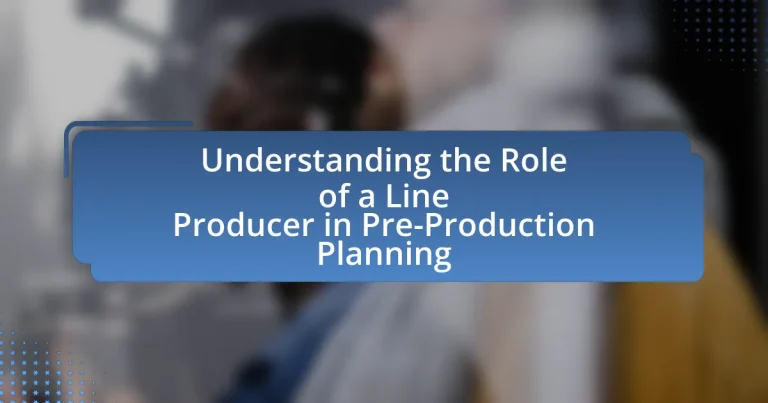The article focuses on the critical role of a Line Producer in Pre-Production Planning for film and television projects. It outlines the responsibilities of a Line Producer, including budget management, scheduling, and resource coordination, which are essential for ensuring a smooth production process. The article also discusses the importance of effective communication and organizational skills, the challenges faced during pre-production, and best practices for successful planning. Additionally, it highlights the impact of thorough pre-production planning on project success and the financial knowledge required for a Line Producer to navigate potential pitfalls.

What is the role of a Line Producer in Pre-Production Planning?
A Line Producer in Pre-Production Planning is responsible for overseeing the budget and logistics of a film or television project. This role involves creating detailed budgets, scheduling, and coordinating resources to ensure that the production runs smoothly. Line Producers also manage the hiring of crew members and securing locations, which are critical for the project’s success. Their expertise in financial management and organizational skills is essential, as they ensure that the project stays within budget and on schedule, ultimately contributing to the overall efficiency and effectiveness of the production process.
How does a Line Producer contribute to the overall production process?
A Line Producer plays a crucial role in the overall production process by managing the budget, scheduling, and logistics of a film or television project. This position ensures that the production stays on track financially and adheres to the timeline, which is essential for meeting deadlines and maintaining efficiency. For instance, a Line Producer coordinates with various departments, such as casting, locations, and crew, to facilitate smooth operations and resolve any issues that may arise during production. Their expertise in resource allocation and problem-solving directly impacts the project’s success, as they are responsible for making critical decisions that affect both the creative and financial aspects of the production.
What specific responsibilities does a Line Producer have during pre-production?
A Line Producer is responsible for overseeing the budget and scheduling during pre-production. This includes creating a detailed budget that outlines all anticipated costs, securing funding, and managing financial resources to ensure the project stays within budget. Additionally, the Line Producer develops a production schedule that coordinates all aspects of the filming process, including location scouting, hiring crew members, and arranging for equipment rentals. They also facilitate communication between various departments, ensuring that all teams are aligned and prepared for the production phase. These responsibilities are critical for the successful planning and execution of a film or television project.
How does the Line Producer coordinate with other departments?
The Line Producer coordinates with other departments by establishing clear communication channels and managing schedules to ensure all teams are aligned with the production timeline. This role involves regular meetings with department heads, such as the director, cinematographer, and art department, to discuss project needs, resource allocation, and budget constraints. For example, the Line Producer may facilitate discussions between the location manager and the art department to ensure that set designs are feasible within the chosen locations. By maintaining a detailed production schedule and budget, the Line Producer ensures that all departments work cohesively towards the common goal of a successful production.
Why is the Line Producer’s role critical in pre-production?
The Line Producer’s role is critical in pre-production because they are responsible for managing the budget and logistics of a film or television project. This includes creating detailed schedules, coordinating with various departments, and ensuring that resources are allocated efficiently. Their oversight helps prevent cost overruns and delays, which are common pitfalls in production. For instance, a well-planned budget by a Line Producer can lead to a smoother shooting schedule, ultimately contributing to the project’s success.
What challenges does a Line Producer face during pre-production planning?
A Line Producer faces several challenges during pre-production planning, including budget constraints, scheduling conflicts, and resource allocation. Budget constraints require the Line Producer to balance creative aspirations with financial limitations, often leading to difficult decisions about which elements of the production can be prioritized. Scheduling conflicts arise when coordinating the availability of cast, crew, and locations, necessitating effective negotiation and flexibility to ensure that all parties can align. Resource allocation involves managing the distribution of limited resources, such as equipment and personnel, which can complicate the planning process and impact the overall timeline. These challenges are critical as they directly influence the efficiency and success of the production.
How does effective pre-production planning impact the success of a project?
Effective pre-production planning significantly enhances the success of a project by ensuring that all logistical, financial, and creative elements are meticulously organized before production begins. This thorough preparation minimizes risks, optimizes resource allocation, and aligns the team’s vision, which is crucial for maintaining timelines and budgets. For instance, a study by the Producers Guild of America found that projects with comprehensive pre-production planning are 30% more likely to stay on schedule and within budget compared to those without such planning. This data underscores the importance of effective pre-production planning in achieving project success.

What skills are essential for a Line Producer in Pre-Production Planning?
Essential skills for a Line Producer in Pre-Production Planning include strong organizational abilities, effective communication, budgeting expertise, and problem-solving skills. Organizational abilities enable the Line Producer to manage schedules, resources, and personnel efficiently, ensuring that all aspects of production are coordinated. Effective communication is crucial for liaising between various departments, including directors, writers, and crew members, facilitating a smooth workflow. Budgeting expertise allows the Line Producer to create and manage financial plans, ensuring that the project stays within its financial constraints. Problem-solving skills are vital for addressing unforeseen challenges that may arise during the planning phase, allowing for quick and effective resolutions. These skills collectively ensure that the pre-production process is executed successfully, laying a solid foundation for the production phase.
How do organizational skills benefit a Line Producer?
Organizational skills benefit a Line Producer by enabling efficient management of resources, schedules, and communication among various departments. These skills allow the Line Producer to create detailed production schedules, allocate budgets effectively, and ensure that all team members are informed and aligned with project goals. For instance, a well-organized Line Producer can prevent costly delays by anticipating potential issues and coordinating timely solutions, which is crucial in the fast-paced environment of film and television production.
What tools and software do Line Producers use for planning?
Line Producers use various tools and software for planning, including Movie Magic Scheduling, Final Draft, and Excel. Movie Magic Scheduling is widely recognized for its ability to create detailed shooting schedules and manage production timelines effectively. Final Draft is primarily used for scriptwriting, allowing Line Producers to collaborate on script revisions and ensure alignment with production schedules. Excel serves as a versatile tool for budgeting, tracking expenses, and organizing production details. These tools are essential for Line Producers to streamline the planning process and enhance communication among the production team.
How does communication play a role in a Line Producer’s effectiveness?
Communication is essential for a Line Producer’s effectiveness as it facilitates coordination among various departments and stakeholders involved in a production. Effective communication ensures that all team members are aligned on project goals, timelines, and resource allocation, which is critical for maintaining the production schedule and budget. For instance, a study by the University of Southern California found that clear communication among production teams can reduce delays by up to 30%, highlighting its impact on operational efficiency. Additionally, strong communication skills enable Line Producers to negotiate effectively with vendors and resolve conflicts swiftly, further enhancing their ability to manage the production process smoothly.
What financial knowledge is required for a Line Producer?
A Line Producer requires comprehensive financial knowledge, including budgeting, cost management, and financial forecasting. This expertise enables them to create and manage production budgets effectively, ensuring that all aspects of the project are financially viable. For instance, a Line Producer must understand how to allocate funds across various departments, track expenses, and adjust budgets as necessary to avoid overspending. Additionally, familiarity with financial reporting and cash flow management is crucial, as it allows the Line Producer to maintain financial oversight throughout the production process.
How does budgeting influence the pre-production process?
Budgeting significantly influences the pre-production process by determining the scope and feasibility of a project. A well-defined budget sets financial limits that guide decisions on casting, location, crew hiring, and equipment rental. For instance, if a budget allocates a specific amount for locations, the line producer must prioritize sites that fit within that financial framework, ensuring that all necessary resources are available without overspending. This financial planning directly impacts the timeline and overall production quality, as constraints may lead to compromises in creative choices or necessitate alternative solutions.
What are the common financial pitfalls a Line Producer should avoid?
Common financial pitfalls a Line Producer should avoid include underestimating budgets, failing to track expenses accurately, and neglecting to secure proper insurance. Underestimating budgets can lead to insufficient funds for essential resources, resulting in project delays or compromises in quality. Accurate expense tracking is crucial; without it, a Line Producer may overlook overspending, which can jeopardize the entire production. Additionally, neglecting to secure proper insurance exposes the production to financial risks from unforeseen events, such as accidents or equipment damage, which can incur significant costs. These pitfalls can severely impact the financial health of a production, making it essential for Line Producers to remain vigilant and proactive in their financial management.

What are the best practices for Line Producers in Pre-Production Planning?
The best practices for Line Producers in Pre-Production Planning include thorough budgeting, detailed scheduling, and effective communication with all departments. Line Producers should create a comprehensive budget that accounts for all aspects of production, ensuring financial resources are allocated efficiently. Additionally, developing a detailed production schedule that outlines key milestones and deadlines is crucial for keeping the project on track. Effective communication with department heads and crew members fosters collaboration and helps to identify potential issues early, allowing for timely resolutions. These practices are essential for minimizing risks and ensuring a smooth production process.
How can a Line Producer effectively manage time during pre-production?
A Line Producer can effectively manage time during pre-production by creating a detailed schedule that outlines all tasks and deadlines. This schedule should include milestones for script revisions, casting, location scouting, and budgeting, ensuring that each phase of pre-production is completed on time. Utilizing project management tools can enhance tracking and communication among team members, allowing for adjustments as needed. Additionally, regular meetings with department heads can help identify potential delays early, enabling proactive solutions. Research indicates that structured timelines and clear communication significantly improve project efficiency in film production.
What strategies can be employed to streamline the planning process?
To streamline the planning process, employing effective communication, utilizing project management tools, and establishing clear timelines are essential strategies. Effective communication ensures that all team members are aligned on goals and responsibilities, reducing misunderstandings and delays. Utilizing project management tools, such as Gantt charts or software like Trello, helps in organizing tasks and tracking progress efficiently. Establishing clear timelines with milestones allows for better time management and accountability, ensuring that the planning process remains on schedule. These strategies collectively enhance coordination and efficiency in pre-production planning, which is critical for a line producer’s role.
How can a Line Producer ensure clear communication among the team?
A Line Producer can ensure clear communication among the team by implementing structured communication channels and regular updates. Establishing a centralized platform for sharing information, such as project management software, allows team members to access real-time updates and documents. Regular meetings, both formal and informal, facilitate open dialogue and address any concerns promptly. Additionally, the Line Producer should encourage feedback and questions, fostering an environment where team members feel comfortable sharing their thoughts. This approach not only clarifies roles and responsibilities but also enhances collaboration, ultimately leading to a more efficient production process.
What common mistakes should Line Producers avoid in pre-production?
Line Producers should avoid underestimating budgets during pre-production. Accurate budgeting is crucial as it directly impacts the project’s feasibility and resource allocation. Failing to account for all potential costs, such as location fees, equipment rentals, and crew salaries, can lead to financial shortfalls that jeopardize the entire production. According to a study by the Producers Guild of America, 70% of productions that exceeded their budgets did so due to inadequate pre-production planning, highlighting the importance of thorough financial assessments.
How can miscommunication affect the pre-production phase?
Miscommunication can significantly disrupt the pre-production phase by leading to misunderstandings about project goals, timelines, and resource allocation. When team members, including the line producer, fail to communicate effectively, it can result in misaligned expectations, which may cause delays in scheduling and budgeting. For instance, a study by the Project Management Institute found that poor communication is a primary contributor to project failure, with 57% of project managers citing it as a key issue. This highlights the critical need for clear communication to ensure that all stakeholders are on the same page, thereby facilitating a smoother pre-production process.
What are the consequences of inadequate planning?
Inadequate planning leads to project delays, budget overruns, and resource misallocation. When a line producer fails to establish a clear plan, it can result in confusion among team members, causing inefficiencies and wasted time. For instance, a study by the Project Management Institute found that 39% of projects fail due to a lack of proper planning, highlighting the critical importance of this phase in production. Additionally, without a structured approach, unforeseen challenges may arise, further complicating the production process and potentially jeopardizing the project’s success.
What practical tips can enhance a Line Producer’s effectiveness in pre-production?
A Line Producer can enhance effectiveness in pre-production by implementing thorough planning and communication strategies. Establishing a detailed production schedule that outlines all phases of the project ensures that timelines are met and resources are allocated efficiently. Additionally, maintaining open lines of communication with the director, crew, and stakeholders fosters collaboration and addresses potential issues early. Utilizing budgeting software to track expenses and manage financial resources effectively can prevent overspending and keep the project on track. Research indicates that projects with clear communication and structured planning are 30% more likely to meet deadlines and stay within budget, highlighting the importance of these practices in a Line Producer’s role.

